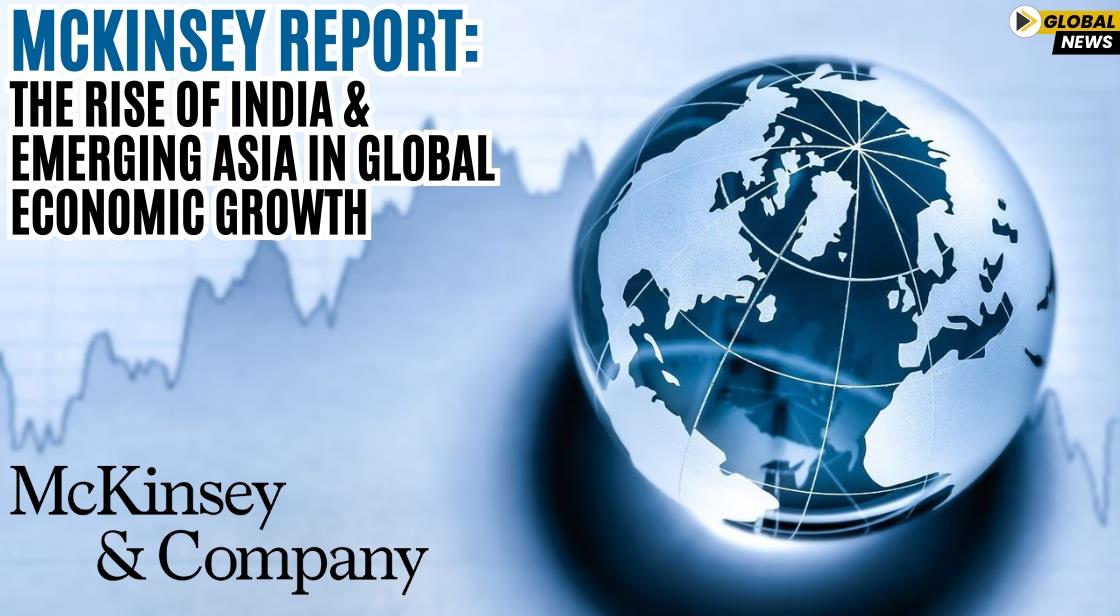McKinsey Report: The Rise of India and Emerging Asia in Global Economic Growth

News Synopsis
According to a recent report by McKinsey Global Institute, the global consumption landscape is undergoing a significant transformation. The shift is marked by an increasing portion of global consumption moving away from traditional markets in North America and Western Europe toward emerging economies in Asia, particularly India.
This change underscores the growing economic influence of these regions, driven by rising incomes, shifting demographics, and changing consumer preferences.
The report reveals that consumption pools are shifting from North America and Western Europe to emerging Asian markets, including India. McKinsey emphasized the growing importance of developing nations in the global economy, stating, “Developing countries will provide a growing share of global labour supply and of consumption, making their productivity and prosperity vital for global growth.”
Key Insights from the McKinsey Report:
India and Emerging Asia’s Role in Global Consumption:
The study predicts that by 2050, India and emerging Asian markets will contribute 30% of global consumption in purchasing power parity (PPP), a remarkable rise from just 12% in 1997.
On the other hand, advanced economies like North America, Western Europe, and Advanced Asia are expected to see their share of global consumption drop significantly. The report forecasts their combined contribution to global consumption will decline to 30%, down from 60% in 1997.
This shift highlights a major shift in the balance of global consumption, as Asia—particularly India—emerges as a driving force in the global economy. The burgeoning middle class, coupled with rapid urbanization and growing purchasing power in countries like India, will be instrumental in shaping future global consumption patterns.
Challenges and Opportunities for Businesses:
The report also identifies key implications for businesses operating worldwide. Companies in both developed and developing regions must adapt their strategies to cater to this new reality. However, McKinsey cautioned that market entry and expansion in these emerging regions could be complex. "Many later-wave countries, including India, have complex legal and governance environments and are prone to conflicts, making market entry and expansion more difficult.”
In addition, affordability will be a major concern as businesses look to target a larger and increasingly diverse consumer base in these regions. Companies will need to rethink their products, services, and pricing strategies to accommodate a wider spectrum of incomes.
The Role of Demographics in Shaping Consumption:
A significant factor driving this shift is the rapid population growth and a young demographic profile in many emerging economies. McKinsey’s report suggests that over the next 25 years, countries in later-wave regions will account for more than half of global consumption. This will be fueled by the growing working-age population, higher disposable incomes, and increased consumer demand.
Emerging economies will not only see a rise in consumption but also a significant boost in labor supply, which will, in turn, fuel productivity and drive long-term growth in the global economy. The evolution of consumption patterns will therefore play a crucial role in shaping global economic trends in the coming decades.
Conclusion:
The shift of global consumption from traditional markets in North America and Europe to India and emerging Asia is one of the most significant economic trends of the 21st century. With rising incomes, young populations, and expanding middle classes, these regions are set to become the engines of global growth.
However, businesses must navigate complex markets and ensure affordability to succeed in these rapidly evolving consumer environments. As this demographic transformation unfolds, the potential for India and its neighbors to reshape the global economic landscape is undeniable.
You May Like









